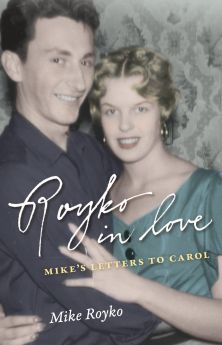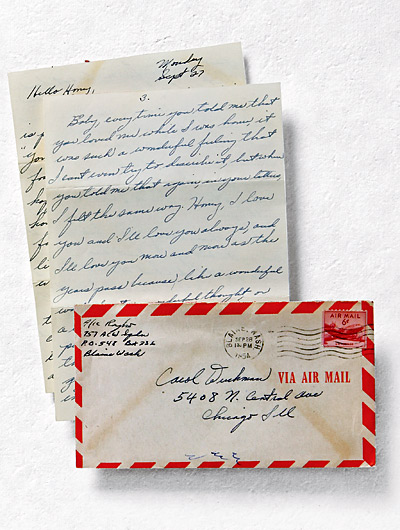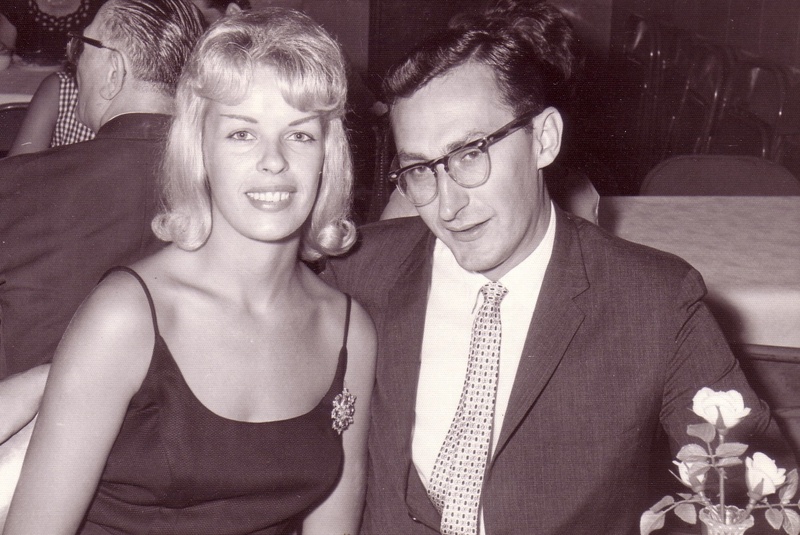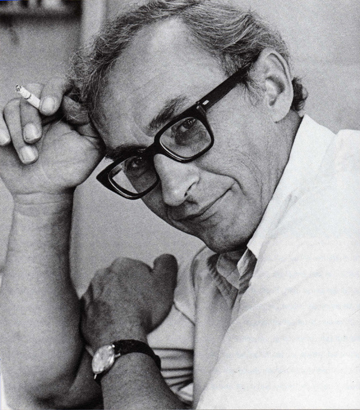 For over 30 years, famed newspaper columnist Mike Royko visited fans five days a week on page 2 of the Chicago Daily News, the Chicago Sun-Times, and the Chicago Tribune. Syndicated in over 600 newspapers nationwide, the Pulitzer Prize-winner wrote with eloquence and street-smart wit on wide-ranging topics including civil rights, Chicago’s political machine, the Cubs, and sensitive, “quiche-eating” men. But despite his more than 7500 columns, it wasn’t often that Royko offered readers even a passing look into his personal life. However, fans can finally glimpse his rarely-shared private side in the new book Royko in Love: Mike’s Letters to Carol. Edited by their son David Royko, the book collects the 114 letters a 21-year-old “Mick” wrote to his childhood sweetheart Carol Duckman from Washington’s Blaine Air Force Base in 1954. Seductive, sarcastic, and riddled with self-doubt, the letters capture the burgeoning brilliance of the future legend as he courts his soon-to-be wife from 2000 miles away. On Sunday, November 13th, you can hear David Royko read from Royko in Love when he visits EPL’s 1st Floor Community Meeting Room at 3 p.m. In anticipation of his visit, we recently spoke with him via telephone about the disappearing art of letter writing, discovering his family’s “holy grail,” his Dad’s many chat room personas, and why Royko in Love makes for “dandy chick lit.”
For over 30 years, famed newspaper columnist Mike Royko visited fans five days a week on page 2 of the Chicago Daily News, the Chicago Sun-Times, and the Chicago Tribune. Syndicated in over 600 newspapers nationwide, the Pulitzer Prize-winner wrote with eloquence and street-smart wit on wide-ranging topics including civil rights, Chicago’s political machine, the Cubs, and sensitive, “quiche-eating” men. But despite his more than 7500 columns, it wasn’t often that Royko offered readers even a passing look into his personal life. However, fans can finally glimpse his rarely-shared private side in the new book Royko in Love: Mike’s Letters to Carol. Edited by their son David Royko, the book collects the 114 letters a 21-year-old “Mick” wrote to his childhood sweetheart Carol Duckman from Washington’s Blaine Air Force Base in 1954. Seductive, sarcastic, and riddled with self-doubt, the letters capture the burgeoning brilliance of the future legend as he courts his soon-to-be wife from 2000 miles away. On Sunday, November 13th, you can hear David Royko read from Royko in Love when he visits EPL’s 1st Floor Community Meeting Room at 3 p.m. In anticipation of his visit, we recently spoke with him via telephone about the disappearing art of letter writing, discovering his family’s “holy grail,” his Dad’s many chat room personas, and why Royko in Love makes for “dandy chick lit.”
Evanston Public Library: There is a great literary and historic tradition based on letter writing ranging from Heloise and Abelard to Ken Burns’ Civil War documentary. Do you feel a sense of loss now that so few people write actual letters? Will that change how we write history?
David Royko: I do. I think with every technological advance there are things you gain and things you lose. Not to say I want to give up my smart phone, but I have a hard time imagining 60 years from now someone putting out a book of their parents’ tweets. It’s remarkable how quickly things change. Just the idea of taking pen in hand, folding up the paper, putting a stamp on the envelope, running to the post office, waiting days for a response… For the generation now coming of age, the whole process is part of history not everyday life.
EPL: I believe you mentioned in the introduction to Royko in Love that writing letters to Carol every day helped your father become a writer because writing became a habitual part of everyday life.
DR: I wish he were still around so I could talk to him about it. One thing about Dad was that he was very practical, very pragmatic. There was a quote that used to hang on his office wall – popular among reporters – that said, “Only a blockhead writes for anything but money.” He wasn’t a thumbsucker writer who would just sit down to philosophize and with the letters he had a very practical reason for writing: his drive to win my mother. It helped him hone his craft. Not to say with no letters he wouldn’t have achieved what he did, but they certainly played a role.
 EPL: One thing your Dad was noted for was the discipline of writing a column 5 days a week which is practically unheard of these days.
EPL: One thing your Dad was noted for was the discipline of writing a column 5 days a week which is practically unheard of these days.
DR: The older I get the more I find it astounding. People often ask me if he wrote ahead in order to buy himself a few days off, but he really didn’t. He wrote about what was happening at the moment, and he wasn’t going to write ahead. That wasn’t the nature of the column.
EPL: Do you think waiting for the letters played a role in the romance? That the anticipation played a significant role?
DR: Significant but not pleasant. He was so anxious, and it comes across in the letters. Anxiety drove him. Things were in reach but that made him that much more terrified of losing her.
EPL: You’ve described the letters as the “holy grail” of your family. Can you tell us how you discovered them, and what it was like reading them for the first time?
DR: My mom sat me down at 13 to have a serious discussion – which was odd – and told me that Dad was not her first husband. It just floored me. It wasn’t that she was ashamed or that is was a secret, but at that point even the mention of Larry would send Dad into a depression or a rage. He just never got over it. The jealousy was still there after all the years. She told me about the letters and how they won her heart, and she told me never to mention it to Dad.
EPL: The letters or her first marriage?
DR: One couldn’t be separated from the other. She meant never to mention Larry which meant never mentioning the letters. Mom died September 19, 1979, and I never talked to Dad about it. After he died on April 29, 1997, I was going through some boxes and found a smaller box with all the letters in perfect chronological order. By the time he died he’d moved half a dozen times but had always kept the letters. He knew they were there and was the only person on earth who did. My wife Karen transcribed them and felt a lot of people would enjoy reading them. I had no sense because I was so close to them. Without these letters, I wouldn’t exist.
EPL: Can you talk about the process of putting Royko in Love together. Was there a lot of editing involved?
DR: There was virtually no editing. The book is all the letters from beginning to end. As I say in the book, I made some spelling corrections only for readability. Originally, though, we transcribed the letters not for a book but for safekeeping. They’re one of a kind, and we wanted to protect them in case of fire or a flood.
EPL: So here’s my geeky librarian question… What have you done to preserve the actual letters?
DR: Nothing. They’re sitting in a safe deposit box. They’re actually remarkably well-preserved since they weren’t handled over the years. They look like they did when Mom packed them away in the 1960’s or 70’s.

EPL: Did anything about them surprise or disappoint you?
DR: Nothing disappointed me. I was happy to learn that they really existed as I imagined them, as Mom described them. They’re funny, sweet, romantic. Dad was already himself. He was already “Mike Royko.” Some of the letters still make me chuckle out loud, and there is so much of hearing him pour his heart out. He was just finding so many ways over 9 months to say “I love you,” and to see him so young, it really humanizes him for me.
EPL: Did you know he was a romantic before the letters?
DR: I knew he could be romantic. Under all his toughness was a sentimental streak a mile wide. People who knew him only through his columns or casually might be shocked by this romantic or sentimental side. His family wouldn’t be shocked but to have so much of it right there… It’s very powerful.
EPL: In certain columns he could be romantic–
DR: November Farewell.
EPL: Yes, and in A Pact to Cherish. He tells Prince Charles and Diana that one day they won’t be as young and good-looking as at the time of their wedding and writes, “But if you haven’t become fools, she will say to you that you are even more handsome now than you were before; and you’ll tell her that she’s more beautiful and desirable then she was then. And you’ll mean it. And if you mean it, then it will be true.”
DR: Yeah. Just now I found myself getting choked up. He was never sappy, and it just hits me right between the eyes. The website for Royko in Love includes various related columns he wrote. They don’t explicitly talk about Mom but they come pretty close.
EPL: Younger women – who I think read some of his columns in isolation – have accused him of being misogynistic. Why do you think that is?
DR: I’m glad you put it that way. Dad was a man of his time historically and of his background, and he could seem misogynistic.
EPL: Like the column about women wearing slit dresses who get mad at men for ogling them…
DR: Yeah. Part of it with Dad was he enjoyed stirring people up. I can see him sitting there with a grin just picturing people getting mad. In practice, though, he had about 30 assistants or “leg people” in all the years from the 1960’s until his death. In all, three were male and the rest were women. They weren’t eye candy or there just to have cute women around. These were tough jobs. It was like grad school to be an assistant to Dad, and they all went on to bigger and better jobs. People like Ellen Warren, Pam Cytrynbaum, Janan Hanna. Some things he wrote blew up, but he was never a bigot, racist, or misogynist. He made everybody mad at times, but it’s wrong to label him as such.
 EPL: Do you know what happened to your mother’s letters?
EPL: Do you know what happened to your mother’s letters?
DR: No. I really don’t know where they would turn up at this point. I do have some theories. Knowing Dad, he could have torn them up one night after a fight or in a drunken rage. But they’re just theories. I honestly have no idea.
EPL: What would your parents have thought of the book?
DR: I remember talking to Dad about the eventual posthumous book that would be written and him saying, “Wait until I’m dead.” If he were alive, he’d kill me. But honestly, if he’s sitting on some cloud somewhere looking down, he’s delighted. The book shows a different side of him. Just his raw talent. He never went to college. He really was a self-taught, self-made genius.
EPL: Your visit is good timing with the release of the new movie Anonymous which suggests Shakespeare couldn’t really be Shakespeare because a working class guy couldn’t have written like that.
DR: Dad was a voracious reader. I remember vacations we took as adults when he would read as many as 2 or 3 books in a day. He was an extremely fast reader but not a skimmer. He read with depth. He was a self-educated guy and talking to him… just the sheer breadth, the depth. If you were talking to a professor you couldn’t have had a deeper conversation.
EPL: Yet he was uncomfortable on TV. He often seemed tongue-tied in public. Was this part of that same insecurity he felt talking to Carol at first?
DR: Yeah he didn’t do much TV or public speaking. Around the right crowd – in the Billy Goat – he could be a great storyteller. But he always thought of himself as a working man, and he didn’t enjoy doing TV. He didn’t think of it as part of his job. His job was to write columns, and damn it that was enough of a job. He worked hard enough to get the column out.
EPL: How do you think he would have reacted to how journalism has changed? What would he have thought about blogs and readers’ comments?
DR: He died in 1997. The Internet was around but by no means like it is today. He could sense where things were going though. At the time, everyone at the Trib had an AOL account including Dad, and he really enjoyed chat rooms. Not as “Royko,” but he’d go in as a character. He had different personas – a truck driver, a doctor – and he’d chat about different subjects. My favorite character that I remember was when he’d go in as an avid collector of artificial limbs. He had some really bizarre conversations.
 He really enjoyed the Net and saw where it was headed, but I think he would have been surprised with the rapidity of change in journalism and how quickly newspapers were buried. I wish he could have lived to be 100, but at the same time, his dying meant he didn’t have to watch. But, then again, it might have been fine. Over the years every once in a while a writer will say, “Royko would think…” It’s B.S. Nobody could know including me.
He really enjoyed the Net and saw where it was headed, but I think he would have been surprised with the rapidity of change in journalism and how quickly newspapers were buried. I wish he could have lived to be 100, but at the same time, his dying meant he didn’t have to watch. But, then again, it might have been fine. Over the years every once in a while a writer will say, “Royko would think…” It’s B.S. Nobody could know including me.
EPL: What would you like readers to take away from Royko in Love, and what can they expect from your visit to EPL?
DR: There are really two distinct audiences. First, of course, the Royko fans, but anyone under 40 I assume hasn’t heard of Royko. Public memory is short. But even if you have no clue about who he was or couldn’t care less, anyone can enjoy the book from the standpoint that it’s a great love story. I always like to say that their story is “dandy chick lit.”
With the program, I strive to be done in an hour or a little more because there are always a lot of questions. Royko fans are interested in all aspects of Dad’s life, and it’s always such a pleasure to be around fans of Dad.
Interview by Lesley W. and Russell J.
